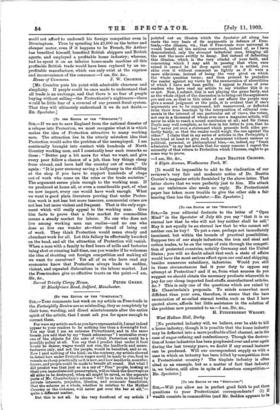Lbe ERE EDITOR OP TIER " SPECTATOR:9 SIR,—If we are
to save England from the national disaster of a relapse into Protection, we must recognise what it is which
makes the idea of Protection attractive to many working men. The attraction lies in the utterly mistaken idea that Protection would solve the problem of the unemployed. I am continually brought into contact with hundreds of North Country working men, and I constantly hear such remarks as these : " Better pay a bit more for what we want, and give every poor fellow a chance of a job, than buy things cheap from abroad, and have half the country out of work." Or again : "It is poor economy saving a halfpenny in the shilling at the shop if you have to support hundreds of chaps out of work who come on the rates or the trade societies." The argument seems plain enough to the working man. If we produced at home all, or even a considerable part, of what we now import, every one would have work enough. What we want is good plain literature proving that under Protec- tion work is not less but more insecure, commercial crises are not less but more violent and frequent. That is the only argu- ment which will really appeal to the working man. Give him facts to prove that a free market for commodities means a steady market for labour. No one who does not live among working men can realise—and no one who does so live can wonder at—their dread of being out of work. They think Protection would mean steady and abundant work for all. Let this fallacy be effectually knocked on the head, and all the attraction of Protection will vanish.
When a man with a family to feed hears of mills and factories being shut or running half-time, can you wonder if he welcomes the idea of shutting out foreign competition and making all we want for ourselves? Yet all of us who have read any economics know that Protection always leads to sudden, violent, and repeated dislocations in the labour market. Let the Free-traders give us effective tracts on the point.—I am, Sir, &c.,






































 Previous page
Previous page